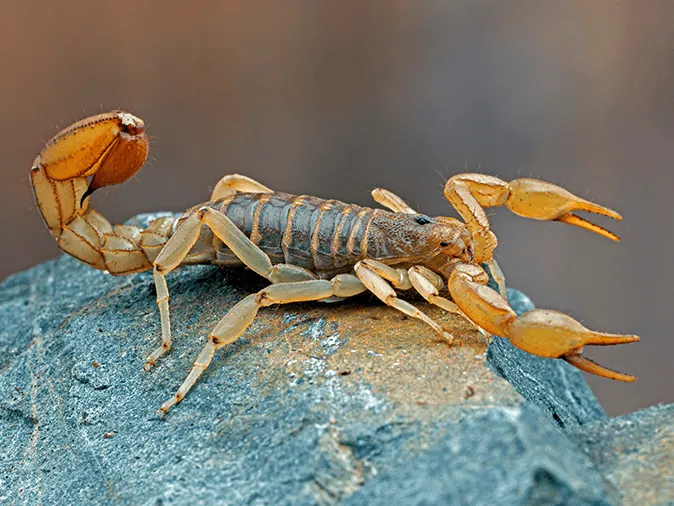No products in the cart.
1. Insects
Insects are the most common prey for scorpions. They provide a steady source of protein and nutrients that scorpions need for survival.
- Crickets: Crickets are a favorite meal for many scorpion species. These fast-moving insects are easily caught by the scorpion’s quick reflexes and powerful pincers.
- Cockroaches: Scorpions are natural predators of cockroaches, which they hunt in dark, moist environments like basements, caves, or under rocks.
- Grasshoppers: Larger scorpions, such as Emperor scorpions, may prey on grasshoppers. The size and strength of the scorpion make it easier to subdue larger prey like grasshoppers.
- Beetles: Scorpions often prey on beetles, which are abundant in many of the environments where scorpions live.
- Termites: In some regions, scorpions actively hunt termites, especially when there is a nearby termite mound or during swarming events.
2. Spiders
Scorpions also hunt and eat spiders. Many spiders provide a good source of protein, and their small size makes them ideal prey.
- Small Spiders: Smaller scorpions may hunt and feed on smaller spiders, which they can overpower easily.
- Larger Spiders: In some cases, larger scorpions, such as the Desert Hairy Scorpion, may even tackle bigger spiders, including tarantulas. However, these encounters depend on the relative size and aggressiveness of the scorpion and spider species.
3. Other Arachnids
In addition to spiders, scorpions may eat other arachnids that they come across.
- Mites: Scorpions may consume small mites they encounter in their habitat.
- Other Scorpions: Scorpions are known to be cannibalistic, meaning they will occasionally eat other scorpions, particularly when food is scarce or during territorial disputes. This is more common among younger or weaker individuals.
4. Small Vertebrates
Larger scorpions may occasionally hunt small vertebrates, particularly if their usual prey is scarce or they have the opportunity to overpower them.
- Small Lizards: Some of the larger species of scorpions, such as the Emperor scorpion, are capable of catching and eating small lizards when the opportunity arises.
- Small Rodents: While less common, some large scorpions may prey on small rodents like mice. They use their powerful pincers and venom to subdue these larger prey.
- Amphibians: Small frogs or toads might fall prey to larger scorpions in their habitat, especially if these amphibians wander into the scorpion’s territory.
5. Other Invertebrates
Scorpions will also eat various invertebrates, making them highly opportunistic hunters.
- Centipedes and Millipedes: Scorpions can overpower and consume centipedes and millipedes, although these invertebrates can sometimes fight back, making them more challenging prey.
- Worms: Worms and other small invertebrates like caterpillars or larvae may also be part of a scorpion’s diet, especially for smaller species or younger scorpions.
6. How Scorpions Hunt and Eat
Scorpions are nocturnal hunters, meaning they are most active at night when they use their keen senses to locate prey. Here’s how scorpions capture and consume their food:
- Pincers: Scorpions use their large, powerful pincers (chelae) to grab and subdue prey. These pincers are strong enough to crush or hold onto struggling prey.
- Venomous Stinger: Once the prey is caught, scorpions use their tail, equipped with a venomous stinger, to inject venom. The venom either paralyzes or kills the prey, depending on its size and the amount of venom delivered.
- Digestion: After immobilizing the prey, scorpions use their chelicerae (small, claw-like mouthparts) to tear apart the prey and consume its soft tissues. Scorpions digest their food externally by secreting digestive enzymes onto their prey to break it down before consuming the liquid portion.
7. Diet Variations by Species
Different species of scorpions may prefer different types of prey depending on their size, habitat, and hunting style:
- Desert Scorpions: Desert-dwelling scorpions, such as the Bark Scorpion, typically feed on insects and small arachnids that are abundant in their arid environments.
- Forest Scorpions: Species like the Emperor Scorpion, which live in more humid environments, may hunt a wider variety of prey, including small vertebrates like frogs and lizards, due to the diversity of prey available in their habitats.
8. Water
Although scorpions don’t drink water as frequently as other animals due to their ability to extract moisture from their prey, they will seek out water sources during particularly dry conditions. This helps them stay hydrated and survive in harsh environments.
Conclusion
Scorpions are opportunistic carnivores that primarily feed on insects, spiders, and other small animals. Larger scorpions may also eat small vertebrates like lizards or rodents. Their ability to hunt a wide variety of prey and adapt to different environments makes them highly effective predators. By using their pincers and venomous sting, scorpions can capture and consume a diverse array of prey, from insects and arachnids to small vertebrates.

